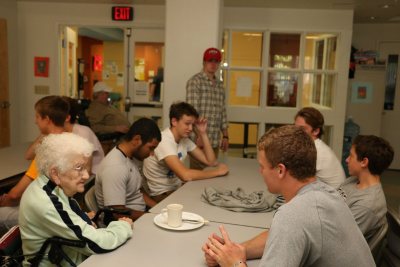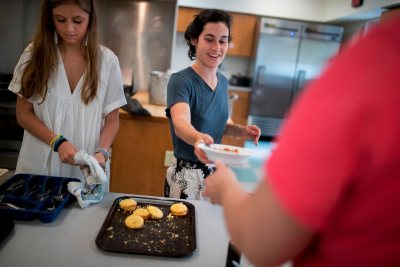Bates students take on food insecurity, tobacco use at Blake Street Towers
 For more than a decade, teams of Bates students have been spending their Sunday mornings preparing and eating brunch with the residents of Blake Street Towers, a low-income independent living facility for seniors and the differently-abled. As the Lewiston Housing Authority’s Director of Resident Services at Blake Street, Carla Harris has been a stalwart partner to Bates, and the collaborations she has shepherded have exemplified mutually beneficial community-engagement. For Bates students, the brunch program offers an opportunity to form a meaningful connection with community members as well as a deeper and more personal understanding of the experience of poverty and aging. For community members, the brunches offer both human connection and a much-needed source of food. During this spring’s five-week Short Term, Bates students built on the successful partnership with Blake Street through a combination of hands-on work and research into the root causes of the challenges facing residents.
For more than a decade, teams of Bates students have been spending their Sunday mornings preparing and eating brunch with the residents of Blake Street Towers, a low-income independent living facility for seniors and the differently-abled. As the Lewiston Housing Authority’s Director of Resident Services at Blake Street, Carla Harris has been a stalwart partner to Bates, and the collaborations she has shepherded have exemplified mutually beneficial community-engagement. For Bates students, the brunch program offers an opportunity to form a meaningful connection with community members as well as a deeper and more personal understanding of the experience of poverty and aging. For community members, the brunches offer both human connection and a much-needed source of food. During this spring’s five-week Short Term, Bates students built on the successful partnership with Blake Street through a combination of hands-on work and research into the root causes of the challenges facing residents.
The scale of food insecurity at Blake Street stood out to a group of four students in Professor Heidi Taylor’s Life Course and Aging sociology class, who continued the brunches this Short Term. To supplement lectures and discussions about theories of aging, groups of students from the course participated in two hours of community-engaged learning at local senior programs each week, doing everything from recording life stories to playing card games. At the conclusion of the course, each team shared reflections about their experiences during final presentations and a full-group discussion. When the Blake Street group compared the circumstances they had seen with the comforts their peers described at other, more costly senior-living facilities, they noted that the residents they worked with were so focused on getting food that they were much less inclined to socialize with them or with one another. How, they wondered, does the stress of worrying about where their next meal will come from impact their mental health, their sense of community, and their experience of aging?
 Scarcity of food has long been a problem for Blake Street residents and for the dedicated staff who support them. The Bates Sunday brunches help, but by no means meet all of the residents’ dietary needs. As Carla Harris explained to Harward Center staff when discussing potential projects, regulations for Section 8 housing require residents to pay a third of their monthly income towards their rent, leaving them with only a few hundred dollars from their social security checks to pay for food, medicine, transportation, and other essentials. By the end of the month, many are left to scrape together snack food or a few canned goods from the nearby convenience store. To seek out solutions, Sophia Thayer, a student from our Short Term Action Research Team (STA/RT), analyzed options for getting affordable, local food from community partners to Blake Street. One immediate benefit of her work is that the Good Food Bus of the St. Mary’s Nutrition Center will now be making regular stops at Blake Street to sell fresh local produce and other goods, making accessing food easier for those with disabilities and transportation issues. Sophia also developed a network of other local food pantries and grocery stores to make regular food donations.
Scarcity of food has long been a problem for Blake Street residents and for the dedicated staff who support them. The Bates Sunday brunches help, but by no means meet all of the residents’ dietary needs. As Carla Harris explained to Harward Center staff when discussing potential projects, regulations for Section 8 housing require residents to pay a third of their monthly income towards their rent, leaving them with only a few hundred dollars from their social security checks to pay for food, medicine, transportation, and other essentials. By the end of the month, many are left to scrape together snack food or a few canned goods from the nearby convenience store. To seek out solutions, Sophia Thayer, a student from our Short Term Action Research Team (STA/RT), analyzed options for getting affordable, local food from community partners to Blake Street. One immediate benefit of her work is that the Good Food Bus of the St. Mary’s Nutrition Center will now be making regular stops at Blake Street to sell fresh local produce and other goods, making accessing food easier for those with disabilities and transportation issues. Sophia also developed a network of other local food pantries and grocery stores to make regular food donations.
Along with the challenges that food insecurity poses, high rates of tobacco use at Blake Street cause additional health problems; smoking rates among residents align with elevated national levels for individuals living in poverty. Students in Melinda Plastas’ Gender and Tobacco Short Term conducted interviews with smokers and former smokers at Blake Street to learn about their reasons for smoking, their views on the effect tobacco has on health, and any previous efforts they had made to quit. They used their findings to inform recommendations to Carla and her staff about effective practices for supporting tobacco cessation efforts without stigmatizing or alienating smokers. Along with Sophia Thayer’s work on food insecurity, the students’ research on tobacco cessation this Short Term will provide a foundation for future collaborations between Bates students and Blake Street staff. While much work remains, it’s always inspiring to see what a few groups of energetic students can accomplish in the span of a five week Short Term when they have a great partner and a cause that inspires them to give their best efforts.